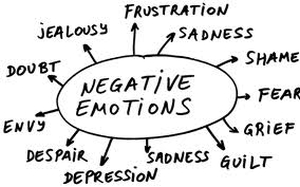Depression
What is Depression and how can it affect us?
Depression occurs when the body, or to be more precise the brain, is low in serotonin. Serotonin is known as a neurotransmitter and it’s thought to control mood, social behaviour, appetite and sleep. While scientists are not absolutely sure what the cause of depression is, they know that when depression occurs the levels of serotonin have dropped within the brain. Serotonin can be also known as the happy hormone.
Scientists are unsure of the exact reasons for the trigger of this hormone to start and deplete however it is thought that the triggers may be caused by some of the stresses of life.
Typically, these may include:-
- Financial;
- Bereavement;
- Illness;
- Isolation or feelings of loneliness;
- Relationship stress such as family or partner.
However, what is understood is the relentless and constant pressure of these situations that can so often lead to people suffering with depression.
So what are the mental and physical symptoms for depression?

- dizziness
- drowsiness and tiredness
- pins and needles
- irregular heartbeat (palpitations)
- muscle aches and tension
- dry mouth
- excessive sweating
- shortness of breath
- stomach ache
- nausea
- diarrhoea
- headache
- excessive thirst
- frequent urinating
- painful or missed periods
- difficulty falling or staying asleep (insomnia)
Common symptoms of panic attacks include:-
- Moving or speaking more slowly than usual;
- Change in appetite or weight (usually decreased, but sometimes increased);
- Constipation;
- Unexplained aches and pains;
- Lack of energy or lack of interest in sex (loss of libido);
- Changes to your menstrual cycle;
- Disturbed sleep (for example, finding it hard to fall asleep at night or waking up very early in the morning).
-
- Not doing well at work;
- Taking part in fewer social activities and avoiding contact with friends;
- Neglecting your hobbies and interests;
- Having difficulties in your home and family life.
However, if you are suffering any of the physical symptoms it should be checked out by your GP thoroughly as there may be other causes.
Depression can come on gradually, so it can be difficult to notice something is wrong. Many people continue to try to cope with their symptoms without realising they are ill. It can take a friend or family member to suggest something is wrong.
Doctor’s measure depression on different levels, mild or low in mood to moderate and severe. There is also psychotic depression; with psychotic depression you would experience hallucinations and delusions and would require hospital treatment. Doctors measure your level of depression through a questionnaire which is based on how you have felt in the last few weeks, and focuses on how much you have enjoyed living on a day to day basis. From this questionnaire they calculate a score that informs them of your level of depression.
Other forms of depression that would be included under this heading are post-natal/postpartum depression and manic depression/bipolar as it known. We must also mention S.A.D or Seasonally Affected Disorder, however with S.A.D doctors prefer to treat this with alternative forms rather than medication as it is believed a lack of vitamin E or lack of available sunshine in the winter months is the major cause of this type of depression.
Manic depression/bipolar
This form of depression is diagnosed when a person experiences episodes of extreme highs and deep lows; the highs show themselves as immense happiness, focus and joy. With these highs sufferers may experience insomnia or as mania. The lows are experienced as deep depressions while in this state, sufferers may experience life as very negative, be unable to stop crying. There is no known cause for this form of depression but it has a deep effect on the sufferer and their family as without the correct mood stabilizers this form of depression can be difficult to cope with. As with depression in general, bipolar has many levels of severity hence why this form should be diagnosed by a clinician before seeking any kind of therapy. However it has been shown that manic depressives can benefit from long term psychotherapy.
Post natal Depression/ postpartum
This form of depression effects women after child birth, however this is not to be confused with baby blues, a period of time usually 1-2 weeks where the mother may feel tearful and exhausted as the pregnancy hormone levels in the body adjust back to normal ranges. Post natal depression will show the same symptoms as depression, however there may be anxiety around caring for the child or about coping and been seen as a bad mother. As with depression, post natal can be measured on mild to moderate and severe level. In my own opinion I believe not feeling that sense of joy at a new-born only compounds feeing like a bad mother hence making the depression feel worse.
Other considerations
I would also like to mention that most people who suffer with depression can also suffer with anxiety. In general 10% of people who suffer with depression also suffer anxiety.
It may have a very confusing state of mind as you feel the apathy of the depression but hyper-activity of the anxiety this mix of sensations can cause sufferers to have anxiety/panic attacks.
Although no one knows exactly why, depression and anxiety often occur together. In one study, 85% of those with major depression were also diagnosed with Generalised Anxiety Disorder (GAD) and 35% had symptoms of panic disorder. Other anxiety disorders include Obsessive-Compulsive Disorder and post-traumatic stress disorder (PTSD). Because they so often go hand in hand, anxiety and depression are considered the fraternal twins of mood disorders.
